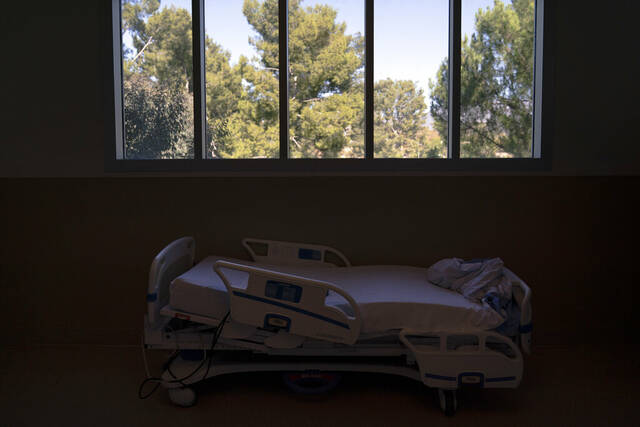Chris Hunter: Amid growing mental health crisis, why are a third of Western Psych beds closed?
There’s an ongoing national conversation about the spiraling mental health crisis — which was aggravated by the pandemic — and the urgent need to put more resources toward our faltering behavioral health system. Here in Pennsylvania, this health care emergency is in many ways more dire than the U.S. overall. Nearly 34% of Pennsylvanians have a mental health or substance use disorder diagnosis, more than the national rate. In Allegheny County, the rate of overdose deaths is significantly higher than statewide and 89% above the rest of the country.
As a nurse at UPMC Western Psychiatric Hospital for the past eight years, I’ve been on the front lines of this unfolding catastrophe. And I’ve watched with alarm as our hospital, the largest behavioral health facility in Western Pennsylvania, is increasingly unable to meet the surging demand for services because nearly a third of all our beds are closed due to extreme staff shortages and turnover. We cannot begin to address our region’s overall mental health needs without solving the problems at Western Psych.
I work at the Center for Eating Disorders at Western Psych. My co-workers and I treat our patients, almost half of whom are kids, with diagnoses including anorexia and bulimia. We work closely with them to foster a healthy approach to nutrition and eating, and it’s deeply fulfilling to help our patients on their journey to recovery. On my lanyard at work, I have a collection of a dozen wristbands that patients have woven for me as a show of appreciation, one of the many recreational activities we offer on our unit. When I’m feeling worn down and discouraged, the wristbands remind me that real change is possible with the right type of mental health treatment and support.
But sadly, that kind of care is not accessible for too many in our community because of the decreasing availability of beds in our facility. Western Psych has around 260 total beds when fully operational, but often only about 180 are open for patients. Almost every floor in our hospital has closed beds. The pediatric wing of the Center for Autism and Developmental Disabilities has been eliminated. And a wing of the Integrated Health and Aging unit has been closed for some time. When we can’t place our patients in the specific units that specialize in their particular diagnosis, it seriously undermines their treatment and recovery.
These cuts have been caused in large part by a lack of staff to provide patient care. There are currently around 115 nurses at Western Psych and many unfilled positions. In the past three years, 123 nurses have left our hospital, a shocking turnover of more than 100%.
It’s extremely difficult to attract and keep psychiatric nurses because this is very tough, challenging work, both emotionally and physically. The staffing shortfalls at Western Psych are reflected in our state at large: Pennsylvania has 6,330 empty positions for mental health professionals, the third worst in the entire nation.
In a letter to the General Assembly, the Hospital Association of Pennsylvania emphasized the “urgent need to incentivize, invest in, retain and grow” the mental health care workforce. As the largest member of the association, with more than $27 billion in revenue and $8 billion in cash and investments, UPMC should walk the talk and take a leadership role in that effort. But wages for Western Psych nurses, especially more experienced staff, lag far behind other Pittsburgh hospitals such as Allegheny General.
The population we treat at Western Psych is often misunderstood, stigmatized and outcast. That’s all the more reason each patient deserves our empathy and to be treated as a whole person, not just a diagnosis. UPMC must do its part to solve the mental health crisis by supporting, retaining and recruiting staff so our patients have full access to the compassionate, effective care they deserve.
Remove the ads from your TribLIVE reading experience but still support the journalists who create the content with TribLIVE Ad-Free.

